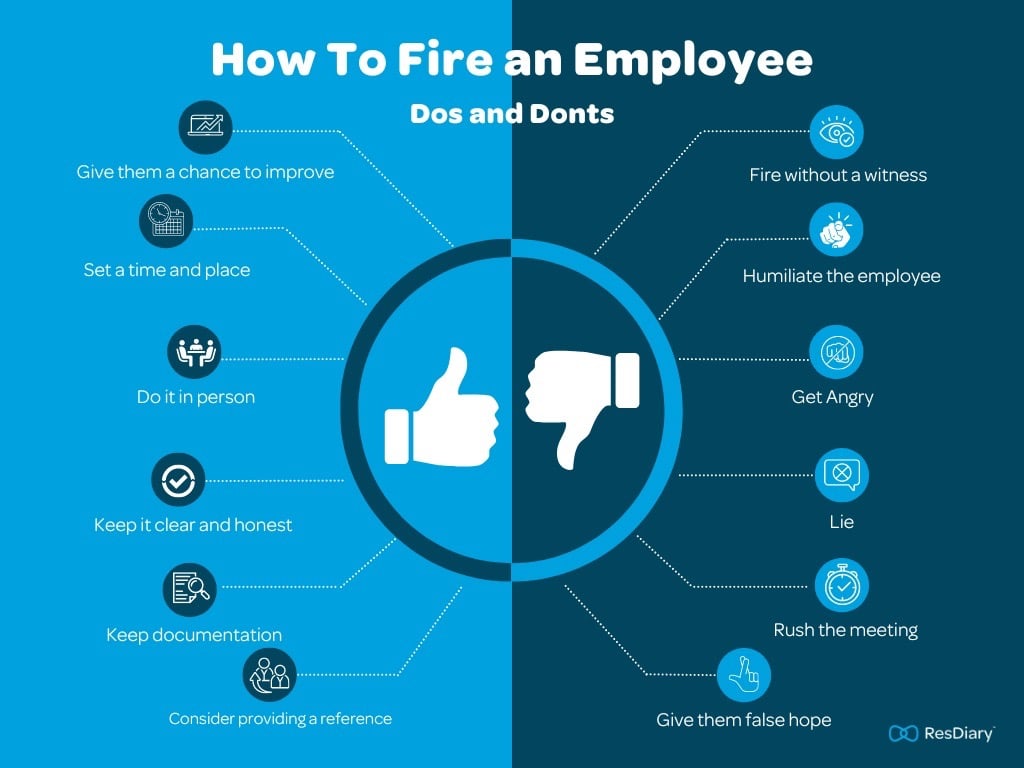It does not matter if it's the right decision; terminating someone's employment is still difficult to get right. It's important to know how to fire an employee effectively and with kindness to protect your business and its reputation. This is especially important for the hospitality industry, which is renowned for its high turnover of staff.
In this guide, we will highlight:
- The reasons for terminating employment
- Unfair dismissal claims
- Rules for different contract types
- Tips for your termination process
- Frequently asked questions
If you are a business owner, restaurant manager or in the HR department, you should feel empowered to navigate this process with confidence to ensure all steps are clear and smooth.
Reasons for ending employment
Before deciding to fire an employee, always give them time to improve on their performance or behaviours and communicate the consequences with them. If there is no signs of improvement, you can proceed to the termination process.
With every type of employee contract, it's crucial to ensure that your reasons for termination are valid and justified. It's always best to ensure multiple managers agree on the termination and that every reason can be backed up with evidence.
Justifiable Reasons for firing an employee
- Criminal activity
- Repeated misconduct
- Breach of company confidentiality
- Substantial Incompetence
- Disruptive behaviour
- Redundancy
Illegal Reasons for terminating someone's employment
The fair work act in Australia protects employees from being dismissed for harsh or unjust reasons which can include:
- The employee was away from work due to illness
- Discrimination, such as against race, sex, sexual orientation, religion or age.
- Involvement with a trade union
- Parental leave
- Complaint made against the employer
What is the Small Business Fair Dismissal Code?
In Australia, the small business fair dismissal code provides a level of protection to small business owners against unfair dismissal claims. It also provides a framework to follow for a fair and clear process.
The Code allows small business employers to terminate an employee without notice if there are valid reasons to believe that the employee's conduct is serious enough to warrant immediate dismissal.
When can an employee claim unfair dismissal?
Under the fair work commission, an employee is eligible to claim unfair dismissal if they have completed the minimum employment period:
Small Business (less than 15 employees) - 1 Year
Large Business (Over 15 employees) - 6 months
The employee will need to apply to the commission within 21 days of the dismissal and provide evidence as to why they believe it was an unfair dismissal.
Terminating Different Employment Contracts
In any business, you may have employees on different types of work contracts. It is important to be aware of the rules for each contract type and ensure your contracts cover the termination process.
Permanent Contracts
Permanent contracts have rights to a notice period under the National Employment Standards. When firing an employee on a permanent contract, you must provide the following notice period depending on their years of continuous employment with you:
- No more than 1 year - 1 week notice
- More than 1 year, but not more than 3 years - 2 weeks notice
- More than 3 years, but not more than 5 years - 3 weeks
- More than 5 years - 4 weeks
An employee over 45 with more than 2 years continuous employment with you is also entitled to an extra week on their notice period.
However, it is possible to terminate an employee without notice if they are involved in serious misconduct.
Temporary Contracts
It is always best practice to give all employees a notice period, including temporary contracts. Before proceeding with the termination meeting, check the employee's contract for any agreed notice periods.
Casual Staff
Under the fair work act, casual employees are not entitled to a notice period. However, we would recommend implementing one wherever possible to uphold a reputation of a business owner who cares.
How to fire an employee with empathy

As a business owner, hospitality manager or line manager, dismissing employees can be one of the most challenging parts of your role. Even if every reason is justified and documented, it is not a nice feeling to fire someone. However, doing it with empathy and efficiently can make the process smoother for everyone involved. Follow our steps for the best possible outcome:
1. Communicate openly and honestly
Throughout the employment relationship, you should communicate openly and honestly on the employee's performance, behaviour and contribution to the company culture. There should be no ambiguity in the employment contract and what is expected in the role so the employee has a clear understanding and an opportunity to raise misunderstandings with you.
Ensure the employee is always aware when their performance is unacceptable and the steps the company can take if it is not rectified.
2. Provide the employee with a chance to improve performance
An empathetic and compassionate approach is to understand that an employee's poor performance may be related to personal circumstances. Before going straight to termination, check if the employee is okay and try to understand what external factors are affecting their behaviour.
Regardless of any circumstances, always give them a chance to improve in the role. Give them reasonable instruction and be clear on what will happen if the expectations are not met.
3. Check violations with other company policies
When terminating an employee, it is important to review all of your company policies to ensure consistency and fairness in the decision-making process. By checking for violations with other company policies, you can ensure that the termination is justified and in compliance with the overall rules and expectations set by the organisation.
This step helps to avoid any potential bias or discrimination and promotes a transparent and objective approach to employee dismissals.
4. Collate all documentation
At every stage of the process, you must keep a paper trail and provide the employee with copies of any warnings, including how both parties acted in any meetings. If a terminated employee does file an unfair dismissal claim, having documentation will ensure your company is transparent and justified in their processes.
At this stage, you should also calculate any severance pay or outstanding wages and their guaranteed written notice period and put it into an official termination letter.
5. Set a time, date and place to meet in person
It's crucial to choose a private place that's comfortable for both you and the employee to give them a chance to express their thoughts and ask questions without worry. Meeting in person is a sign of respect for the employee and choosing the right setting may affect how they react.
Give them enough notice to attend and bring a support person if they wish.
6. Keep your cool and show empathy
Telling someone they no longer have a job can be an emotional conversation for both parties. As the employer, you should not rise to any of their reactions or get angry. Being honest about the reasons whilst being empathetic is key to ensuring a smooth meeting.
Do not make the team member feel like they have failed, instead make them understand that the role may not be the best fit for them. The goal of the meeting should be to ensure they leave the company as an employee with the potential to come back as a customer.
7. Be honest with your other employees
Without open and honest communication, rumours will spread and other employees could potentially worry about their own job security. To keep your team morale strong, use this as an opportunity to control the narrative and lay out the valid reason for terminating employment. Boost their confidence by providing feedback on their own performance and bring the team closer together to work towards the business goals.
By showing the whole team that you treated the terminated employee with fairness and respect, you will build further trust with your employees.
Frequently Asked Questions
Can I terminate an employee over the phone?
You should always terminate an employee in a face to face meeting as a sign of respect, even if you have a valid reason to justify firing. Terminating an employee over the phone could be deemed unfair in a dismissal claim.
Does HR need to be present during a termination?
It is not a requirement for your human resources team, if you have one, to be present during termination. However, a HR team will know the best practice for terminating an employee and should be involved in the dismissal process.
What to say when letting an employee go?
Let them know your decision in a clear but compassionate way. Do not make them feel they have failed but rather, why the role is not suited to them. Discuss all the details of the dismissal process, notice period and pay. Give them a chance to express their thoughts and feelings but keep your responses professional.



